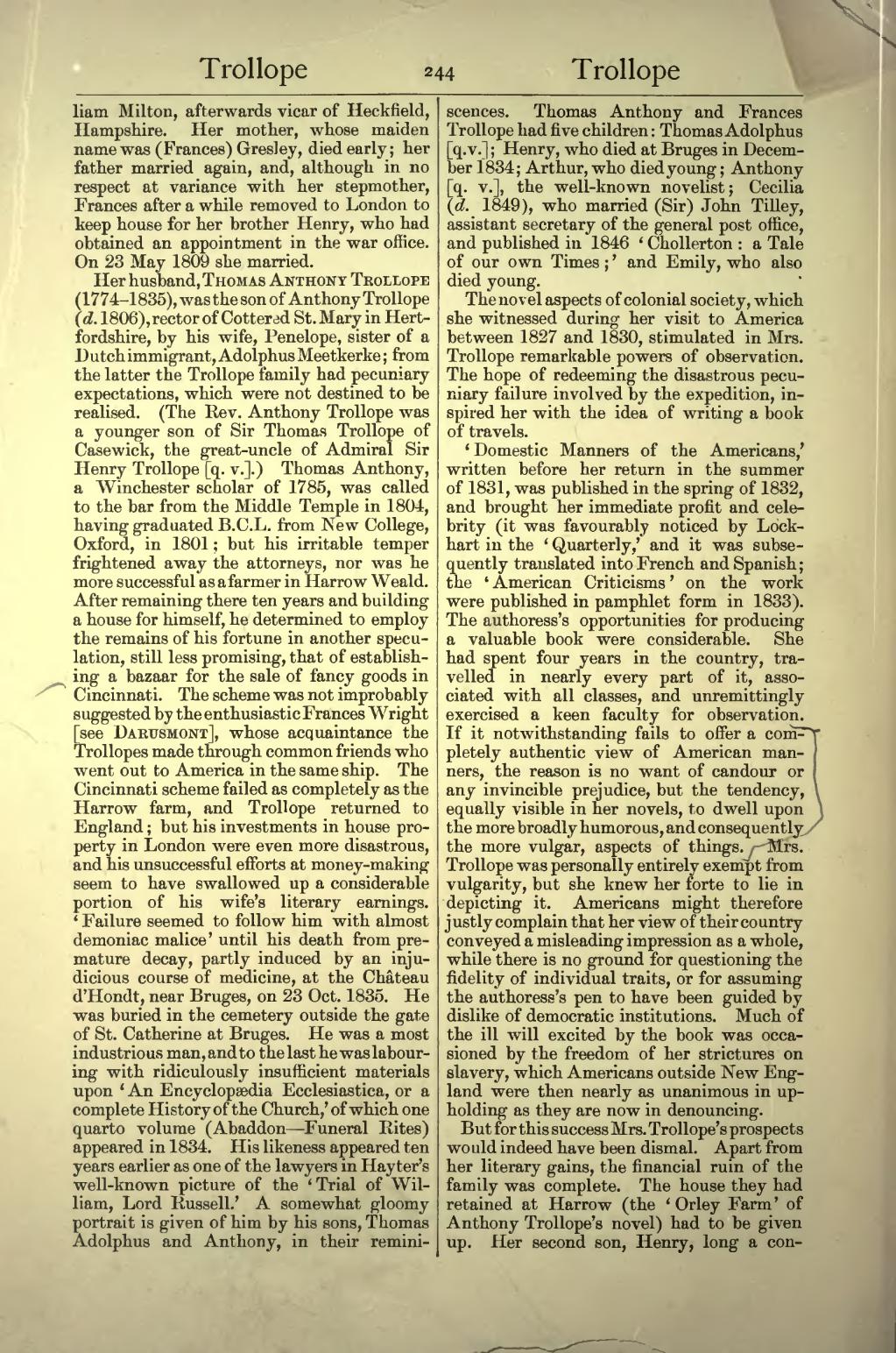liam Milton, afterwards vicar of Heckfield, Hampshire. Her mother, whose maiden name was (Frances) Gresley, died early; her father married again, and, although in no respect at variance with her stepmother, Frances after a while removed to London to keep house for her brother Henry, who had obtained an appointment in the war office. On 23 May 1809 she married.
Her husband, Thomas Anthony Trollope (1774–1835), was the son of Anthony Trollope (d. 1806), rector of Cottered St. Mary in Hertfordshire, by his wife, Penelope, sister of a Dutch immigrant, Adolphus Meetkerke; from the latter the Trollope family had pecuniary expectations, which were not destined to be realised. (The Rev. Anthony Trollope was a younger son of Sir Thomas Trollope of Casewick, the great-uncle of Admiral Sir Henry Trollope [q. v.]). Thomas Anthony, a Winchester scholar of 1785, was called to the bar from the Middle Temple in 1804, having graduated B.C.L. from New College, Oxford, in 1801; but his irritable temper frightened away the attorneys, nor was he more successful as a farmer in Harrow Weald. After remaining there ten years and building a house for himself, he determined to employ the remains of his fortune in another speculation, still less promising, that of establishing a bazaar for the sale of fancy goods in Cincinnati. The scheme was not improbably suggested by the enthusiastic Frances Wright [see Darusmont], whose acquaintance the Trollopes made through common friends who went out to America in the same ship. The Cincinnati scheme failed as completely as the Harrow farm, and Trollope returned to England; but his investments in house property in London were even more disastrous, and his unsuccessful efforts at money-making seem to have swallowed up a considerable portion of his wife's literary earnings. ‘Failure seemed to follow him with almost demoniac malice’ until his death from premature decay, partly induced by an injudicious course of medicine, at the Château d'Hondt, near Bruges, on 23 Oct. 1835. He was buried in the cemetery outside the gate of St. Catherine at Bruges. He was a most industrious man, and to the last he was labouring with ridiculously insufficient materials upon ‘An Encyclopædia Ecclesiastica, or a complete History of the Church,’ of which one quarto volume (Abaddon–Funeral Rites) appeared in 1834. His likeness appeared ten years earlier as one of the lawyers in Hayter's well-known picture of the ‘Trial of William, Lord Russell.’ A somewhat gloomy portrait is given of him by his sons, Thomas Adolphus and Anthony, in their reminiscences. Thomas Anthony and Frances Trollope had five children: Thomas Adolphus [q. v.]; Henry, who died at Bruges in December 1834; Arthur, who died young; Anthony [q. v.], the well-known novelist; Cecilia (d. 1849), who married (Sir) John Tilley, assistant secretary of the general post office, and published in 1846 ‘Chollerton: a Tale of our own Times;’ and Emily, who also died young.
The novel aspects of colonial society, which she witnessed during her visit to America between 1827 and 1830, stimulated in Mrs. Trollope remarkable powers of observation. The hope of redeeming the disastrous pecuniary failure involved by the expedition, inspired her with the idea of writing a book of travels.
‘Domestic Manners of the Americans,’ written before her return in the summer of 1831, was published in the spring of 1832, and brought her immediate profit and celebrity (it was favourably noticed by Lockhart in the ‘Quarterly,’ and it was subsequently translated into French and Spanish; the ‘American Criticisms’ on the work were published in pamphlet form in 1833). The authoress's opportunities for producing a valuable book were considerable. She had spent four years in the country, travelled in nearly every part of it, associated with all classes, and unremittingly exercised a keen faculty for observation. If it notwithstanding fails to offer a completely authentic view of American manners, the reason is no want of candour or any invincible prejudice, but the tendency, equally visible in her novels, to dwell upon the more broadly humorous, and consequently the more vulgar, aspects of things. Mrs. Trollope was personally entirely exempt from vulgarity, but she knew her forte to lie in depicting it. Americans might therefore justly complain that her view of their country conveyed a misleading impression as a whole, while there is no ground for questioning the fidelity of individual traits, or for assuming the authoress's pen to have been guided by dislike of democratic institutions. Much of the ill will excited by the book was occasioned by the freedom of her strictures on slavery, which Americans outside New England were then nearly as unanimous in upholding as they are now in denouncing.
But for this success Mrs. Trollope's prospects would indeed have been dismal. Apart from her literary gains, the financial ruin of the family was complete. The house they had retained at Harrow (the ‘Orley Farm’ of Anthony Trollope's novel) had to be given up. Her second son, Henry, long a con-
